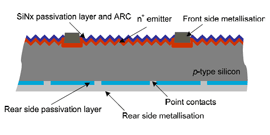Germany-based Q-Cells has announced that it has used an advanced solar cell technology to achieve an efficiency of 17.84% and an output of power of 268 w in polycrystalline solar modules.
 cross section of solar cell design
cross section of solar cell design
The Q-Cells module is made of 60 high-efficiency 156x156 mm² polycrystalline cells. Across an aperture area of 1.492 m², the module testing produced an efficiency of 17.84%. The rating has been confirmed by the European Solar Test Installation (ESTI).
Passivated with functional nanolayers in Q-Cells research centre, polycrsytalline silicon wafers, with 180 µm thickness and metallised on the rear side, were used as the base material for the solar cells. Compared to the BSF technology, the improvised backside structure with local contacts and dielectric layers helped in increasing the cell’s output.
A peak efficiency of 18.45% was confirmed when the cells were individually tested at the Fraunhofer Institute for Solar Energy System. The improved backside structure makes it suitable for a wide range of thin wafers and silicon qualities. The high efficiency will make it possible to cut down industrial production costs. Developed at Q-Cells’ facility at Thalheim, Germany; the implementation of the solar cell technology will be followed after transferring it to the Malaysian production facility.
Federal Ministry for the Environment (BMU) and the federal state of Saxony-Anhalt provided funds to develop the technology.
The Senior Vice President Technology at Q-Cells, Peter Wawer stated that the company seeks to achieve higher efficiency ratings of 20% using the technology platform.